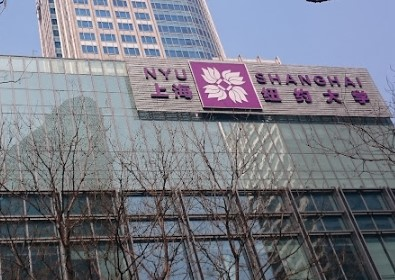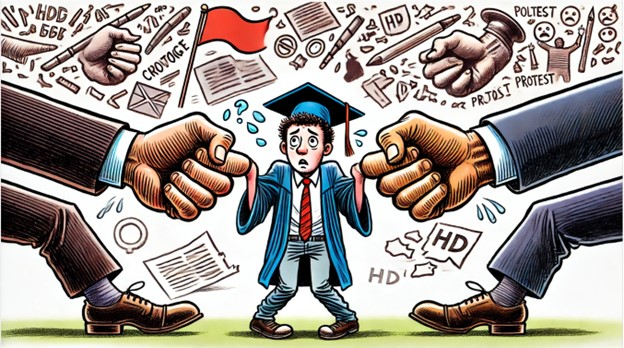Between Empires: The Quiet Struggle of China’s International Campuses
Input
Modified
An Experiment in Global Education, Now Under Strain Academic Freedom Tested by the Winds of Authoritarianism Can Bridges Withstand the Political Storm?

An Experiment in Global Education, Now Under Strain
A student debating foreign policy with a classmate in the lively corridors of NYU Shanghai alternates between English and Mandarin. A professor at Duke Kunshan University lectures on the historical legacies of colonialism in a seminar room, treading a fine line as they cautiously explore topics that would be censored at the majority of Chinese institutions. In the face of increasing administrative supervision, an LGBTQ+ student organization at Wenzhou-Kean University is experiencing difficulty in renewing its club charter.
These are not isolated narratives; they are snapshots of a vast experiment: China's joint venture universities (JVUs). These universities were established over the past two decades through partnerships between Chinese and Western institutions, often American ones, with the intention of combining the East and West in an educational environment that defies borders, dialects, and ideologies. JVUs such as Duke Kunshan, NYU Shanghai, Wenzhou-Kean, and the Tianjin Juilliard School became prominent symbols of globalization and mutual understanding due to their English-language curricula, international faculty, liberal arts pedagogies, and dual-degree programs.
But as U.S.-China tensions escalate and domestic political controls tighten in Beijing, these campuses are now at a crossroads, caught between two powerful forces, struggling to defend their founding vision while adapting to increasingly fraught realities.

Academic Freedom Tested by the Winds of Authoritarianism
The foundation of joint venture universities was a deceptively straightforward concept: that Chinese students could obtain a Western-style education without the need to leave China, while international students could experience China in an academically rigorous, diverse, and open environment. It was a mutually beneficial arrangement. Universities such as NYU, Duke, and Kean offered academic structure and prestige, while China provided funding, infrastructure, and enthusiastic students.
The JVUs were distinct from the conventional higher education system in China. They operated within unique legal frameworks, with committees that were jointly overseen by Chinese and foreign partners. Their libraries and internet access remained largely uncensored, and their faculty had unprecedented freedom to design curricula. However, some students were able to freely investigate academic databases that were otherwise restricted by the Great Firewall by securing VPN access to U.S. servers.
Initially, these institutions were also shielded from the broader political tensions that were developing between Washington and Beijing. Despite the prevalence of trade conflicts, sanctions, and espionage charges in the media, campuses such as the Hopkins-Nanjing Center and Duke Kunshan remained as uncommon spaces for dialogue, where the East and West engaged in collaboration rather than confrontation.
Nevertheless, the insulation has begun to fracture.
The prestigious joint institute that the University of Michigan and Shanghai Jiao Tong University co-founded in 2005 was abruptly dissolved in October 2024, following the University's precipitous announcement that it would terminate its nearly 20-year partnership. The partnership had become a "national security threat," as warned by Rep. John Moolenaar, chair of the House Select Committee on the CCP, in an open letter. Following this, the decision was made. The letter purportedly stated that China had implemented joint research initiatives to advance military technologies, such as CT imaging systems, rocket fuel designs, and 6G wireless transmission, frequently employing research that was financed by U.S. federal grants.
An incident in 2023 that occurred near Camp Grayling, a military training site in Michigan, was rumored to have added fuel to the fire. The incident involved five Chinese students at the University of Michigan. The students' enrollment in the joint institute raised uncomfortable concerns, despite the fact that they denied espionage and were ultimately charged with misleading investigators, not spying.
Moolenaar cautioned that the outcomes of these partnerships could potentially be detrimental to the United States, and he encouraged American universities to discontinue their partnerships with Chinese institutions.
Michigan is not the sole instance. UC Berkeley has reportedly begun dismantling its partnership with Tsinghua University, which was once celebrated as a model of tech and engineering collaboration, and Georgia Tech severed ties with its Shenzhen joint institute in September 2024.
These actions are having a cascading effect across the Pacific, not only in terms of diplomatic relations but also on the very campuses that were designed to transcend such divisions.

Can Bridges Withstand the Political Storm?
Academic freedom is the true litmus test for these universities, as it is much more difficult to quantify than funding or rankings.
For years, joint venture campuses prospered precisely because they provided what traditional Chinese universities were unable to: critical engagement with global ideas, interdisciplinary learning, and open dialogue. Students studied subjects such as colonialism, global governance, gender theory, and political philosophy, frequently under the guidance of foreign faculty and evaluated according to Western standards.
However, a chill has descended.
Political scrutiny has intensified, particularly in response to Xi Jinping's broader initiative to bolster ideological control over higher education, as indicated by recent reports from students and faculty. At numerous JVUs, student organizations—particularly those that address foreign culture, LGBTQ+ rights, and feminism—have experienced restrictions or closures of their operations.
A student attempted to organize a Japanese culture event on one campus; however, the Communist Party Youth League committee informed him that the event was "politically inappropriate" due to the strained relationship between Japan and China. Other students have reported that they were required to submit event proposals for ideological review prior to receiving approval.
The classroom has also been subjected to pressure. Currently, professors, particularly those from foreign countries, engage in informal self-censorship by discreetly refraining from discussing subjects such as the status of Taiwan, Hong Kong protests, or Xinjiang. Certain readings have been eliminated by some. Others have reported feeling compelled to moderate critical discussions in the classroom.
Nevertheless, JVUs maintain a higher level of transparency than the majority of Chinese universities. The "ideology" course that was mandatory at NYU Shanghai was restructured to emphasize Chinese history and culture over political doctrine. The course was limited to one week and did not carry any credit. At Duke Kunshan, foreign faculty members continue to teach courses in ethics, public policy, and even protest literature, always with an emphasis on balance.
Libraries are not subject to censorship. Faculty members continue to have VPN access. And most importantly, students—many of whom have studied abroad—continue to engage passionately with complex issues, even if the boundaries of what’s permissible are more uncertain.
The universities are adapting, but the space for genuine intellectual freedom is narrowing. Despite the political headwinds, these institutions remain, in many respects, success stories. Applications to Duke Kunshan rose 77% in 2023, with half of them coming from U.S. students. NYU Shanghai saw nearly 19,000 international applications during the pandemic, becoming the only Chinese university allowed to bring foreign students back during COVID lockdowns.
Graduates from joint ventures are highly sought after—by multinational companies, NGOs, academic institutions, and even diplomatic corps. Many become “cultural translators,” bridging East and West with empathy, nuance, and language skills few others possess.
This is precisely what President Xi seemed to acknowledge in his 2023 letter to Kean University President Lamont Repollet, praising JVUs as vehicles of U.S.-China friendship and soft diplomacy. His announcement of the 50,000-student initiative, offering to host American students in China, further signaled that even Beijing sees value in these exchanges—at least when they serve national image and strategy.
But the question remains: can these universities survive growing skepticism in the West and tightening control in the East?
Their futures may depend on several factors:
- Whether the U.S. government can differentiate constructive academic exchange from potential tech transfer risks.
- Whether China will preserve the autonomy that makes JVUs unique—or gradually assimilate them into its national education system.
- Whether faculty and students can continue navigating sensitive issues with both integrity and diplomatic finesse.
If either government decides that educational openness is too risky, the entire experiment could collapse.
And yet, there is reason to persist.
Education is one of the last avenues for dialogue as the U.S. and China's relations deteriorate on nearly every front, including trade, defense, technology, and human rights. JVUs continue to serve as bridges in an era of increasing barriers.
President Santa Ono may have been speaking on behalf of a significant number of individuals when he stated, despite the fact that Michigan's partnership with SJTU was terminated, that "international experiences are essential for our students in this interconnected world." He underscored that U-M would continue to pursue global collaborations, albeit with greater caution.
If managed wisely, JVUs could still be laboratories of peaceful coexistence, where students learn not only physics or political science, but how to coexist in a divided world.
In that sense, these universities matter now more than ever—not because they’ve succeeded perfectly, but because they continue to try.





















